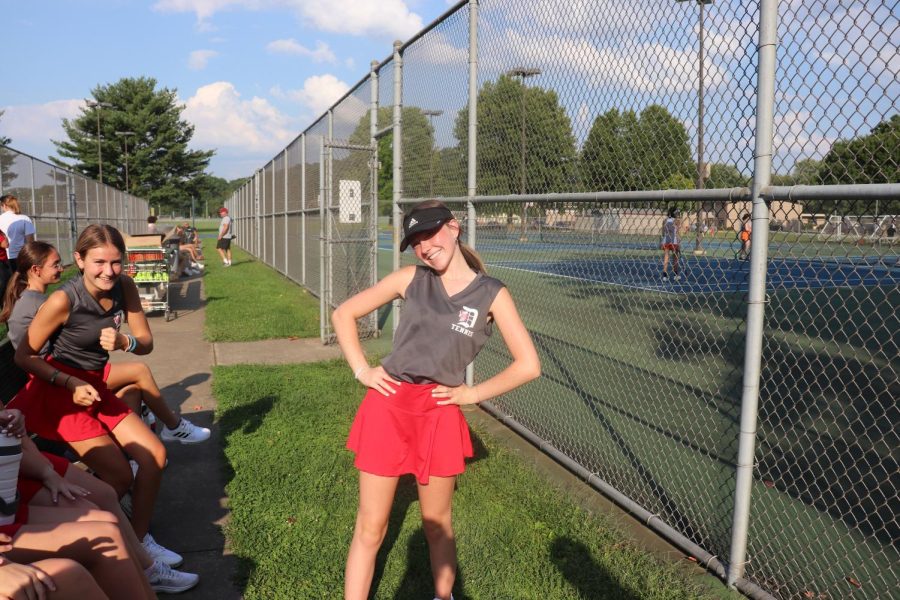Match Madness
September 27, 2022
If you play a sport, you know the stress of having to go up against a teammate. It’s not the best feeling when it comes to what position you earn, based on who you’ve played against. But let’s talk about the emotions that come with it. In tennis, you have to play challenge matches, which is like a tournament within your own team. There’s a bracket with everyone and wins and losses determine whether you move on to the next ‘round’ or if you play in a separate bracket. Official practices start on August 1st which is when challenge matches usually start. Did I mention we have a week to figure out the lineup with an invite that Saturday? In that invite, it’s the first time you’re playing in the actual season. It lasts almost all day and you play 3 matches, I guess you can say by the time you get home you’re exhausted. Playing one match per day is a lot let alone three.
You may be asking, “How do challenge matches work?” Coaches put you in brackets, which determines how many games or sets you’ll play. For instance, if you’re higher up on the bracket, you’ll most likely play a full 2 out of 3 sets which is a normal match. However, if you’re lower on the bracket, you might play first to 6 games or perhaps even an 8 game pro set.
Not to mention that if you have a large team, (does 18 players sound about right?) those challenge matches are even shorter, making it harder to accurately tell which girl is more fit for a certain position than the others. Only time can tell, and time is something we don’t have, so we just have to go with the flow and figure it out along the way.
Picture this:
You are a freshman and so excited to start your first year of tennis. Little did you know that just around the corner lies an unexpected obstacle: challenge matches. Panic quickly rises as you hear the news. How on earth are you going to play your whole team when you have never played tennis before? There’s no time to figure out scoring, serves, or even how to properly swing your racket. The next week of practice is looking pretty bleak. You begin to wonder what you have gotten yourself into…
So, I know this example is a little exaggerated… Okay, maybe more than just a little, but challenge matches are very stressful.
As you can probably tell, a lot of stress and nerves come from challenge matches. Another aspect is the added stress of potentially having to play against a friend, which can get complicated. The main factor is the players’ emotions that day. From my personal experience, when you wake up that morning you are already mentally preparing yourself for your challenge match. In fact, tennis is mostly a mental game, your mindset is a big component of tennis. It’s difficult to be calm when you know that win or lose, you’re playing against a teammate who is probably feeling the same way you are.
Within such a short period of time, the team has to figure out the lineup. It’s difficult to determine the positioning of 18 girls within a week. But the amazing coaches we have manage to find the most effective and fair way possible to do so. That week is specifically focused on challenge matches, which leaves the team with little time to prepare and drill for the invite and games following that week. We decided to talk to members of the tennis team and seek out their thoughts on challenge match week.
We want to make it clear that it is not the coaches’ fault for the bad timing of challenge matches. When the season starts and when practice can officially begin plays a big part in our limited timeline. Practice (unless it is one of the optional open courts) can not even be scheduled until August first, while the season officially starts about a week later. However, the boy’s team does not face this problem since their season is in the spring and they do not have the time limit of summer break. Although we do not have much time, our coaches make the best of it by trying to get the matches done in the first several days of the week. They try to give us a day or two at the end of the week to (hopefully) all figure out the basics by the upcoming Saturday invite for varsity and the first match of the season for JV.
We first asked senior Kaleigh McCutcheon how she felt about the challenge matches; her response was, “I think challenge matches are really important for the team, and I think they are really good practice for match scenarios, however, they are really nerve-wracking. Not only are you playing your teammates, who you like and don’t want to have to beat or lose to, but the outcome of the match also determines your placement for the season. That’s kind of a lot, especially since in tennis you can have on and off days”.
To add to the stress of challenge matches, having on and off days comes with tennis. There are days when you will play your best and other days when you might ask yourself “What am I doing?”. On those days you just have to push through, and I think that’s what makes tennis so difficult and different from any other sport. Not many people know it or give enough credit to tennis players because the truth is, you don’t know or understand how hard the sport is until you play it.
So much goes into it: like techniques that can take years to perfect, endurance, and mental focus. You could be playing a match anywhere from 45 minutes to 3 ½ hours that involves constant movement and focus. While managing so many things, you’re also fighting the constant heat. It could be 90 degrees outside, but on the tennis court, it’s easily 10 to 15 degrees warmer than the actual temperature. And you can only get water breaks on changeovers which are less than 90 seconds.
We also asked Kaleigh what advice she would give to underclassmen who are going into their first year of challenge matches; she says, “My advice to underclassmen would be to try to take the matches seriously and use them as a learning experience, but also not to put too much stress in them. Having experience in match scenarios is invaluable, but when you get too worked up about how important they are, it only makes you play worse. Play challenge matches like they’re just a regular season match.”
Putting stress on yourself when playing matches is a natural instant; it’s being human. However, sometimes you just have to remember that although challenge matches are important, tennis is meant to be a fun lifelong sport. Many other sports usually people stop playing after college, but tennis is something that you can easily continue.
We also decided to ask a first-year tennis player, freshman Ellie Barnhart about her thoughts on challenge matches. She said, “I didn’t know what they were.” Most freshmen and first-year players do not find out about challenge matches until the first day of practice, which is why it is so confusing. She also explained, “They make me really nervous because they are the one time when we can actually progress,” which is also true because the challenge matches you play determine your spot on the team for pretty much the whole season, although there are some exceptions. Ellie told us that “I feel really disappointed in myself if I don’t move up.” It can really lower your confidence if you do not do well in these matches. I know from my first experience with challenge matches last year that they do not always go well. It lowered my confidence to some degree and took plenty of time and hard work through the season to work my way up to a better position.
The stress levels of challenge matches are different for everyone. Whether you are a first-time tennis player or a “seasoned pro,” there is still some level of nerves that comes with the game. Anyone who has ever played tennis can attest to this at some point in their career. Tennis is all about staying calm and focused under pressure, and challenge matches, whether you like it or not, are a big part of the game.




